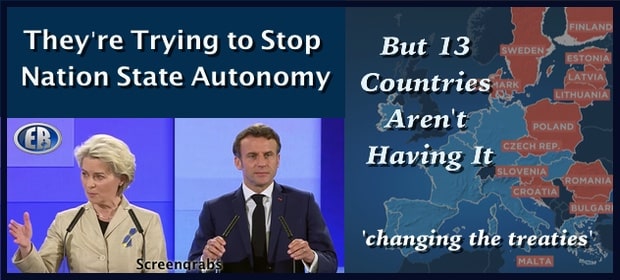
ER Editor: This is a very critical issue. The right of veto is a key principle and practice for individual EU member states when they vote. Basically, if a country isn’t happy with a policy, their single ‘no’ vote is enough to get that policy stopped completely. So a vote needs to be unanimous (‘unanimous voting’) for a policy to be adopted. Hungary is a case in point: it cannot comply with the freshly-minted EU embargo on Russian energy, being unable to find alternative energy sources within less than 5 years. See Hungary Announces Veto on Oil Embargo. And Croatia, we learn below, wants to prevent Sweden and Finland fast-tracking their way into NATO.
This article by Leo Klinkers from last year (see The right of veto as a hand grenade in the European Council) explains the contentious issue:
The European Council of 27 heads of state and government takes decisions by consensus. If one or more members do not support a decision because it threatens their national interests, there is no consensus, and the decision does not go through. From this procedure, one deduces that the Council takes its decisions by unanimity. And so, in the event of a vote against, there is a right of veto. It has been argued several times that this should be partially abolished and that decisions on subjects such as foreign and security policy should be made by qualified majority voting. That has always been rejected. On 24 March 2021, the Dutch Prime Minister Mark Rutte (ER: globalist) and his Spanish colleague Pedro Sánchez (ER: ditto) sent to the President of the European Council Charles Michel, the President of the European Commission Ursula von der Leyen and to the current EU President António Costa a discussion paper on strengthening Europe’s strategic autonomy. To this end, they advocate the partial abolition of the right of veto. …
We learn in this article that Macron had given a speech in 2017 advocating for the removal of unanimous voting:
In that lecture, Rutte echoed the view of Emmanuel Macron’s ‘Sorbonne lecture’ of 29 September 2017. Macron then advocated a radical reorganization of the EU system which, in his view, could only take place by deciding more decisively in the European Council and thus by abolishing the principle of unanimity.[1]
The article continues:
… Abolishing the right of veto in the Council makes it even more undemocratic. It reinforces the oligarchic structure and culture within the Council. While the European Council in itself is an oligarchy within the overall EU system of 27 members who can make decisions without being held accountable, there is an additional oligarchy within that Council in that France and Germany call the shots. If the right of veto is abolished, it will be much easier for this small group to manoeuvre a majority behind its proposals. This means even more uncontrollable power in even fewer hands.
And there you have it. Who is endorsing this removal of the right of veto? Macron of France and von der Leyen of Germany. But they’re facing effective resistance.
This article by euronews also explains the current situation whereby torpedoing this right of veto must be done by changing the ‘treaties’, which are not specified. See Explained: Why EU countries are at odds over treaty changes.
********
13 EU countries publish a text against Macron and his proposal to abolish the right of veto
LE MEDIA EN 4-4-2
Replacing unanimous voting with majority voting and removing the right of veto at the European level is a sweet dream of President Emmanuel Macron and Ursula von der Leyen, following an American scenario.
The problem is that to establish majority voting, you have to achieve unanimity first …
.
The President of the European Commission, Ursula von der Leyen and Emmanuel Macron spoke on Monday May 9 of wanting to abandon the unanimous vote of the Twenty-Seven in key areas. Ursula von der Leyen said these rules were no longer relevant if the EU wanted to move forward faster. “I’ve always said that unanimity voting in some key areas just doesn’t make sense anymore, if we’re going to be able to move forward faster.“
Why does the question arise today? Two major events have taken place recently in the war between Ukraine and Russia. Indeed, Hungary has not supported the EU sanctions against Russian gas and Croatia will veto the accession of Finland and Sweden to NATO. It is therefore enough that a single country is opposed to turn the tide. The right of veto in the two previous cases prevented the situation from escalating and a world war exploding, which does not seem to the taste of our two Atlanticists, Macron and Ursula von der Leyen.
However, they will have to get used to it, since 13 countries of the European Union have published a text against the proposal to completely abolish the right of veto of the States: Bulgaria, Croatia, Denmark, Estonia, Finland, Latvia, Lithuania, Malta, Poland, Czech Republic, Romania, Slovenia, Sweden.
Here is the excerpt from the non-paper of the 13 EU countries on the results and follow-up of the Conference on the Future of Europe:
“The ideas presented by citizens at the conference should speak for themselves and deserve serious follow-up. They should not be used to serve particular institutional interests. […] We also recall that any decision will be taken within the framework of the distribution of competences established by the Treaty and in full respect of key principles such as subsidiarity and proportionality. We recall that treaty change was never an objective of the conference. What matters is that we respond to the ideas and concerns of citizens. While we do not rule out any options at this stage, we do not support ill-considered and premature attempts to launch a process of treaty change. […] We already have a functioning Europe. We don’t need to rush into institutional reforms to get results.”
Non-paper by Bulgaria, Croatia, the Czech Republic, Denmark, Estonia, Finland, Latvia, Lithuania, Malta, Poland, Romania, Slovenia, and Sweden on the outcome of and follow-up to the Conference on the Future of Europe pic.twitter.com/YMRd6SKcJI
— Sweden in EU (@SwedeninEU) May 9, 2022
Translation:
The Conference on the Future of Europe was an unprecedented democratic exercise. It has facilitated a stimulating dialogue with and between citizens across Europe on how they see the role of the European Union in the years to come. We welcome the ideas and proposals that citizens have put forward. The conference demonstrated a clear and positive interest in discussing real policies and specific outcomes that affect citizens in their daily lives. The same applies to national debates with the citizens of the Member States.
The ideas presented by citizens at the conference should speak for themselves and deserve serious follow-up. They should not be instrumentalized to serve particular institutional interests. We look forward to carefully studying the report of the conference and the specific proposals. In this regard, we recall that each institution will follow up in accordance with its own rules of procedure and the rules agreed at the conference. We also recall that any decision will be taken within the framework of the division of competences established by the Treaty and in full respect of key principles such as subsidiarity and proportionality. We recall that treaty change was never an objective of the conference. What matters, is that we respond to the ideas and concerns of citizens. While we do not rule out any options at this stage, we do not support ill-considered and premature attempts to launch a process of treaty change. This would run the risk of diverting political energy from the important tasks of finding solutions to the questions our citizens expect answers to and managing the urgent geopolitical challenges facing Europe.
The EU’s handling of crises in recent years — including covid-19 and Russia’s current aggression against Ukraine — have clearly shown how much the EU can do within the framework of the Treaty. current. The EU has acted quickly to find — and implement — common and effective solutions. We already have a functioning Europe. We don’t need to rush into institutional reforms to get results. As for the conference, we look forward to engaging constructively in the work ahead, based on the insights and insights of citizens.
The Media in 4-4-2
*************
Source

••••
The Liberty Beacon Project is now expanding at a near exponential rate, and for this we are grateful and excited! But we must also be practical. For 7 years we have not asked for any donations, and have built this project with our own funds as we grew. We are now experiencing ever increasing growing pains due to the large number of websites and projects we represent. So we have just installed donation buttons on our websites and ask that you consider this when you visit them. Nothing is too small. We thank you for all your support and your considerations … (TLB)
••••
Comment Policy: As a privately owned web site, we reserve the right to remove comments that contain spam, advertising, vulgarity, threats of violence, racism, or personal/abusive attacks on other users. This also applies to trolling, the use of more than one alias, or just intentional mischief. Enforcement of this policy is at the discretion of this websites administrators. Repeat offenders may be blocked or permanently banned without prior warning.
••••
Disclaimer: TLB websites contain copyrighted material the use of which has not always been specifically authorized by the copyright owner. We are making such material available to our readers under the provisions of “fair use” in an effort to advance a better understanding of political, health, economic and social issues. The material on this site is distributed without profit to those who have expressed a prior interest in receiving it for research and educational purposes. If you wish to use copyrighted material for purposes other than “fair use” you must request permission from the copyright owner.
••••
Disclaimer: The information and opinions shared are for informational purposes only including, but not limited to, text, graphics, images and other material are not intended as medical advice or instruction. Nothing mentioned is intended to be a substitute for professional medical advice, diagnosis or treatment.





